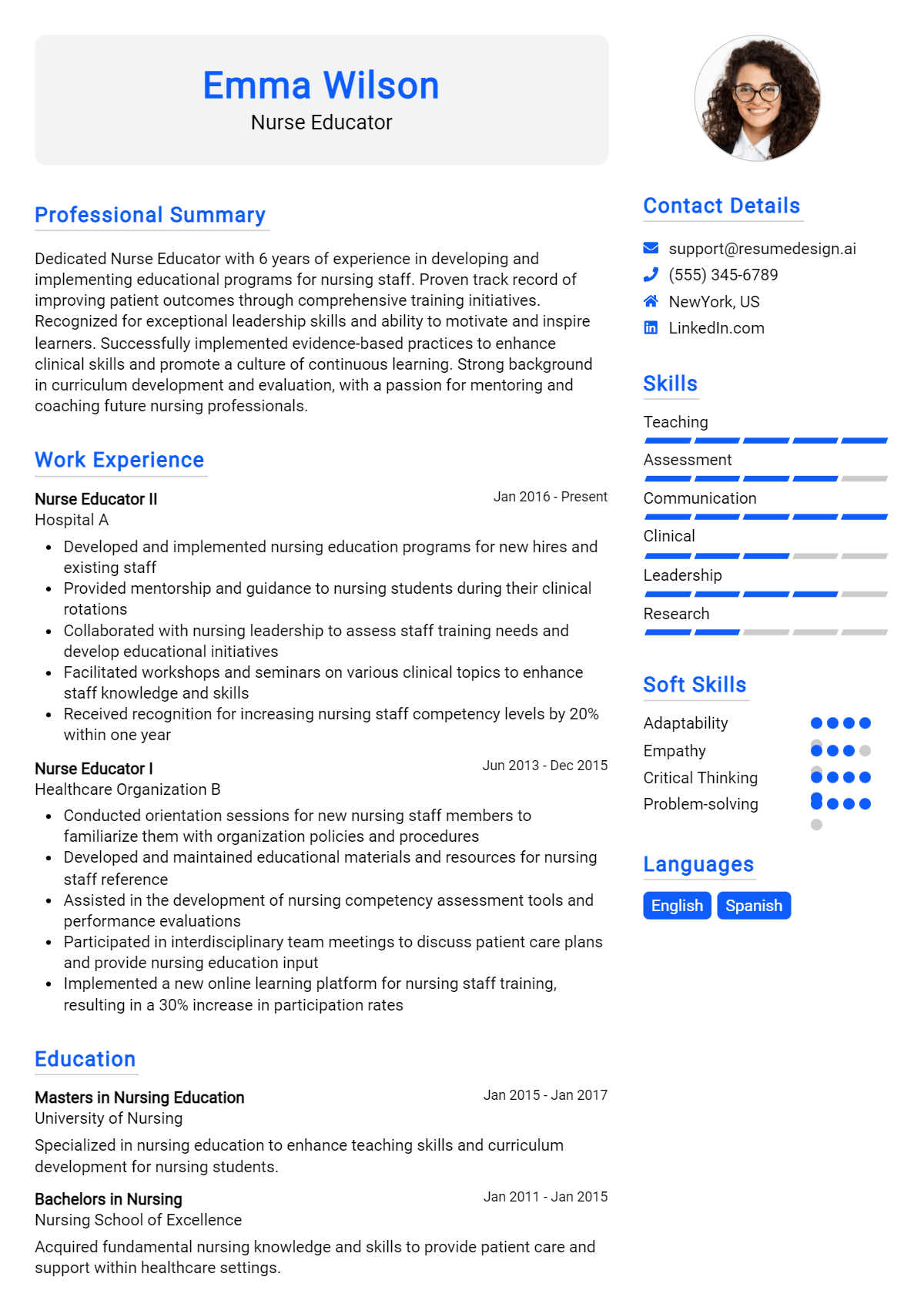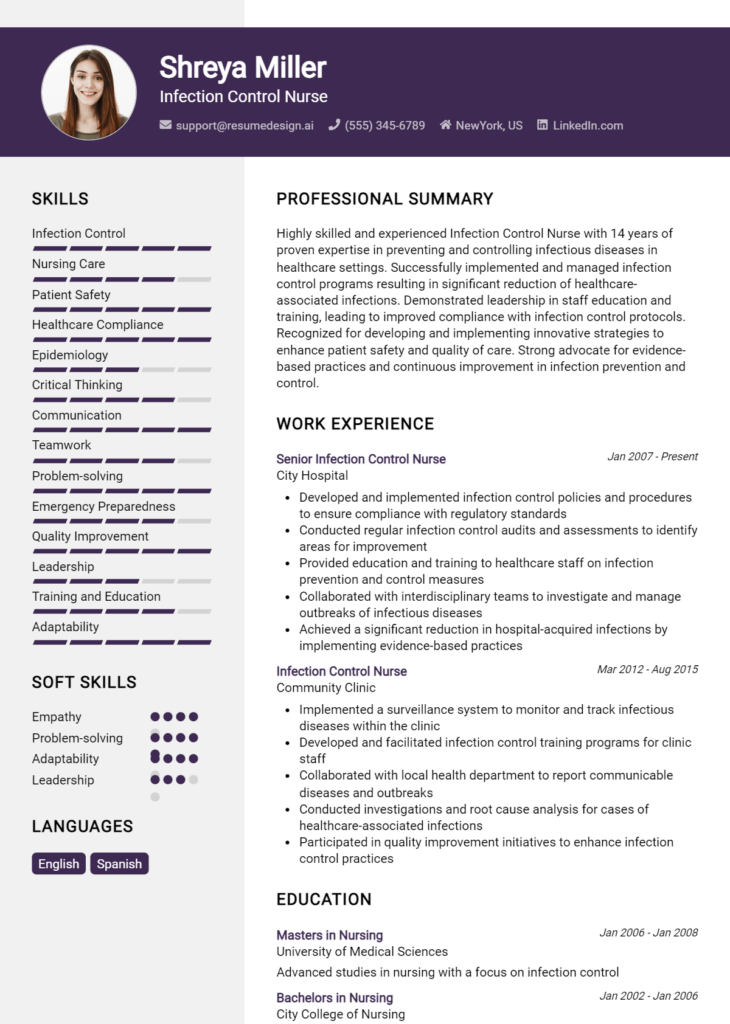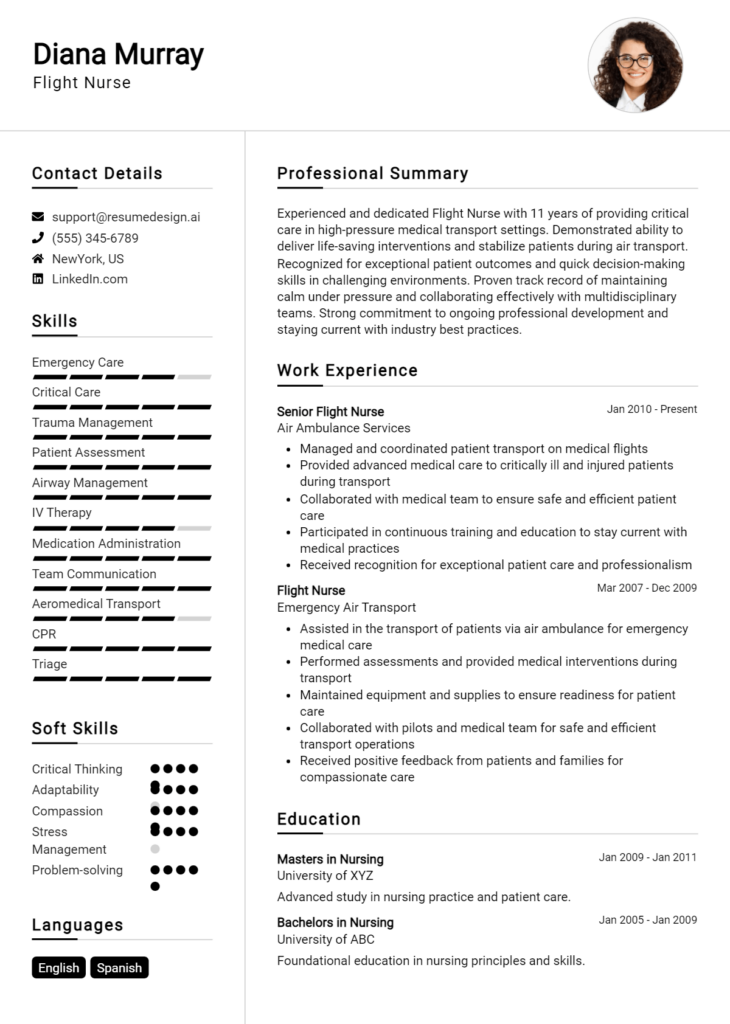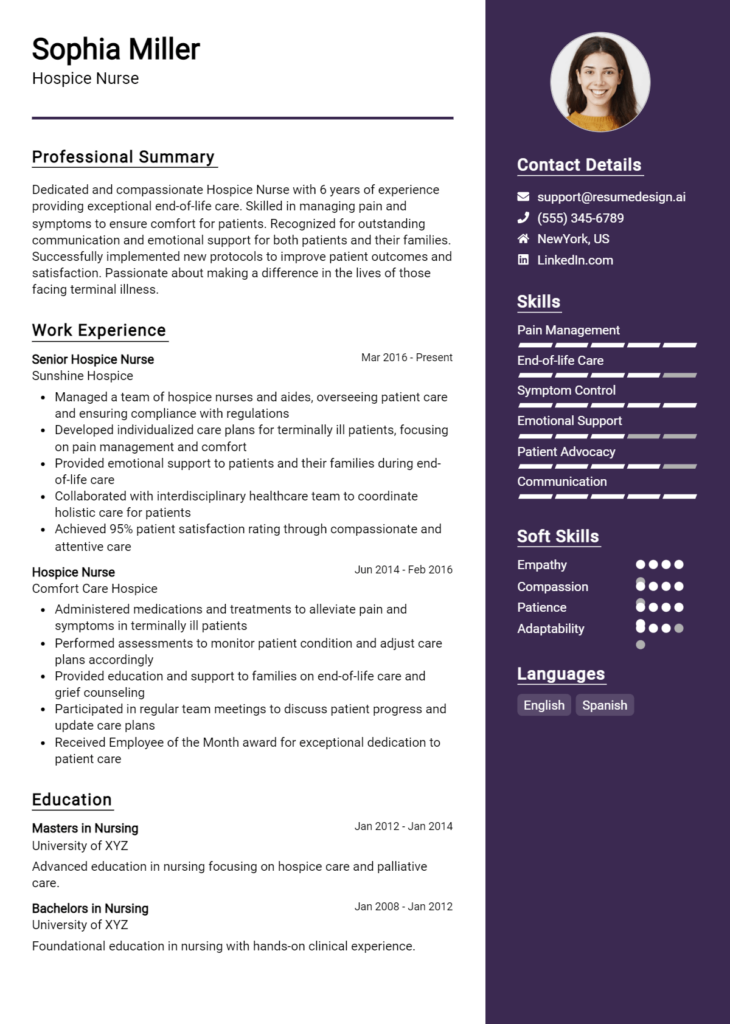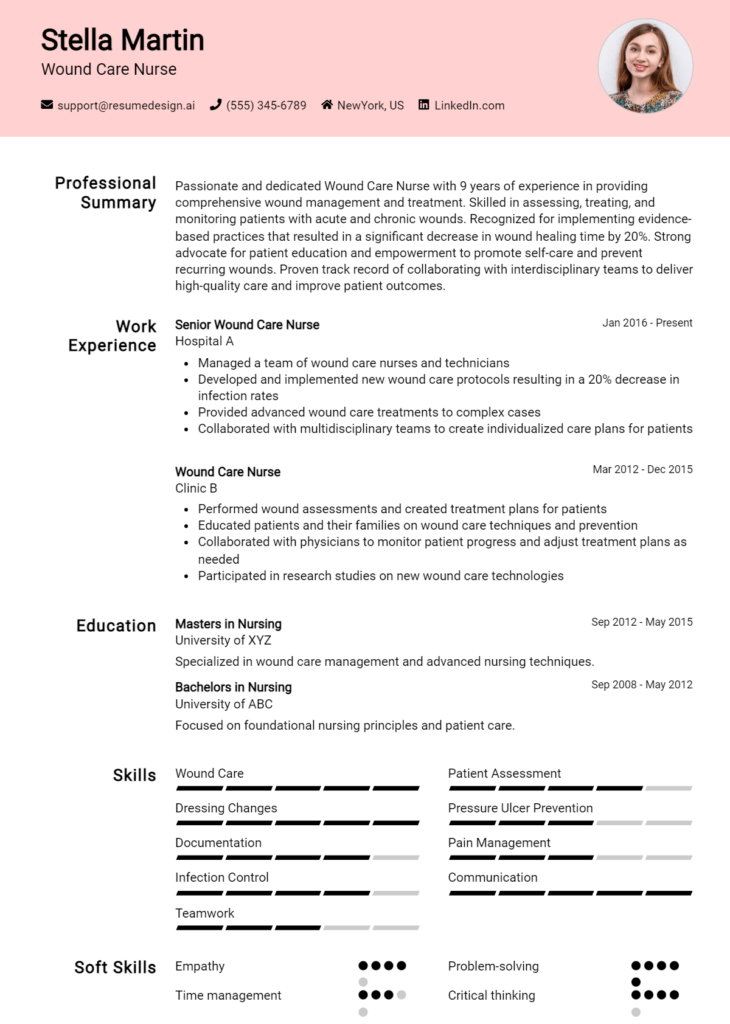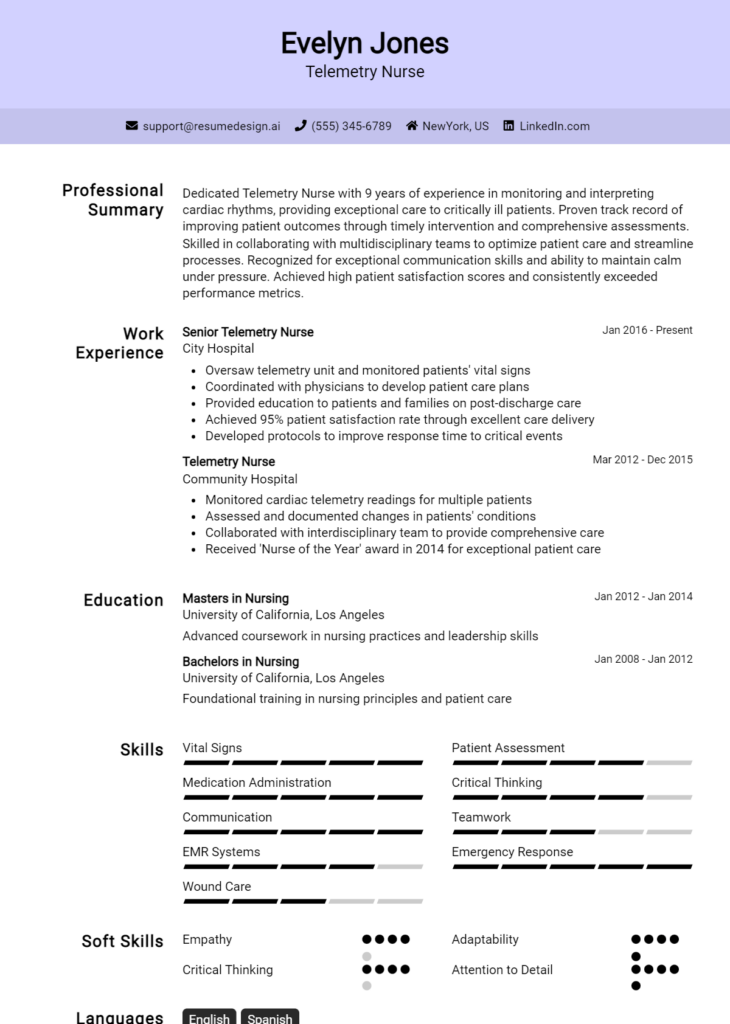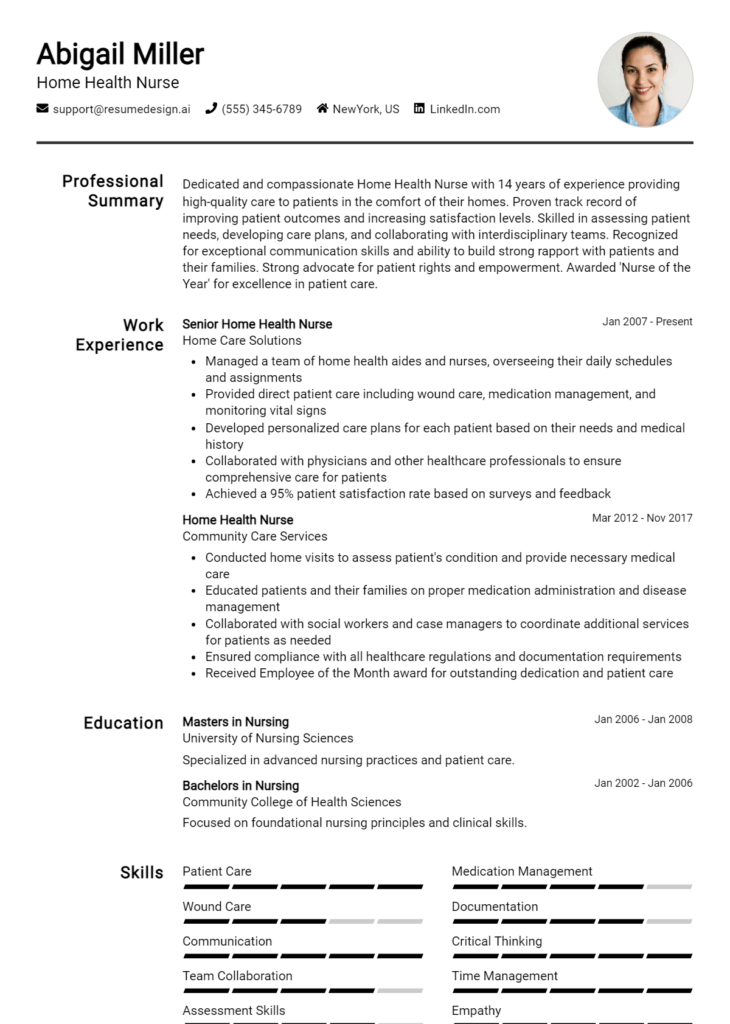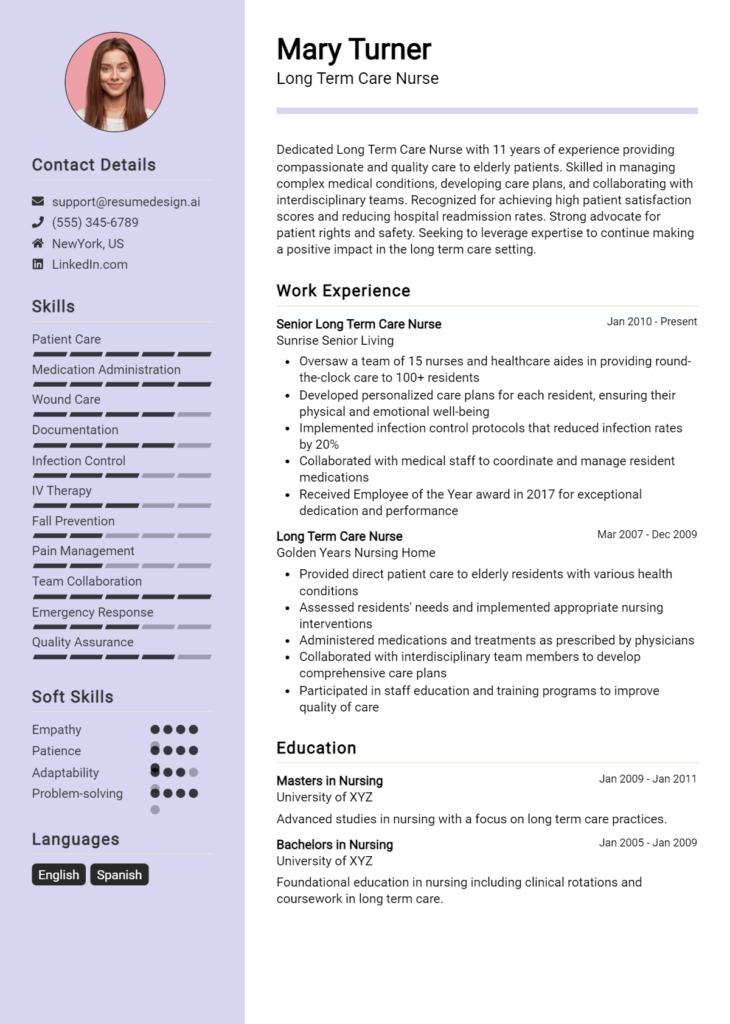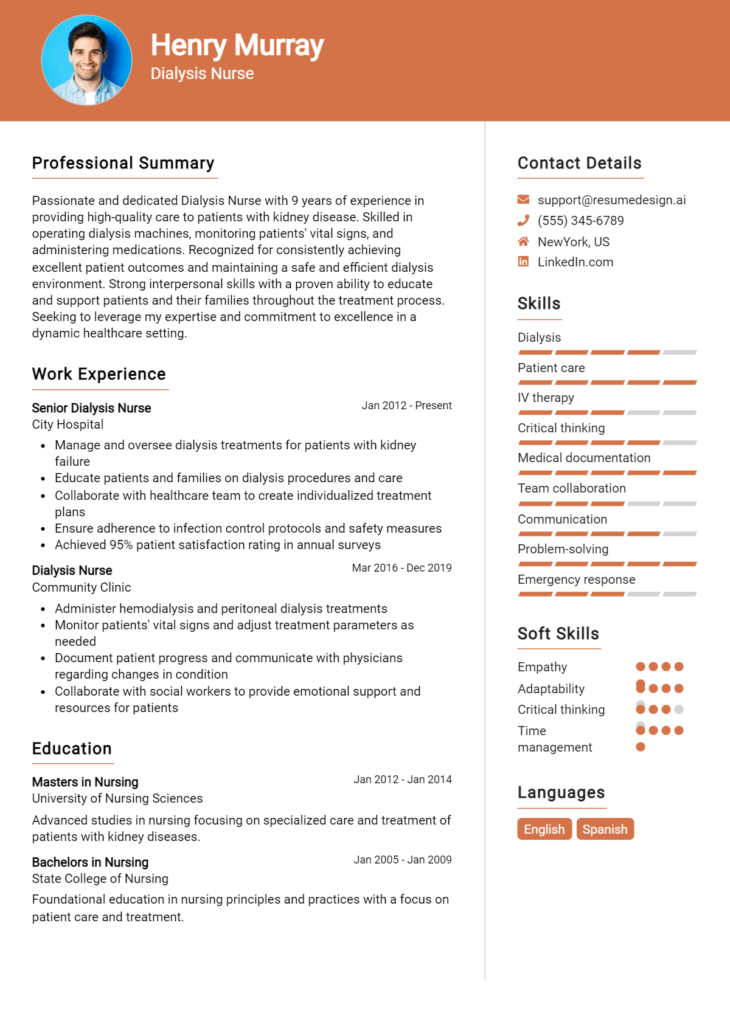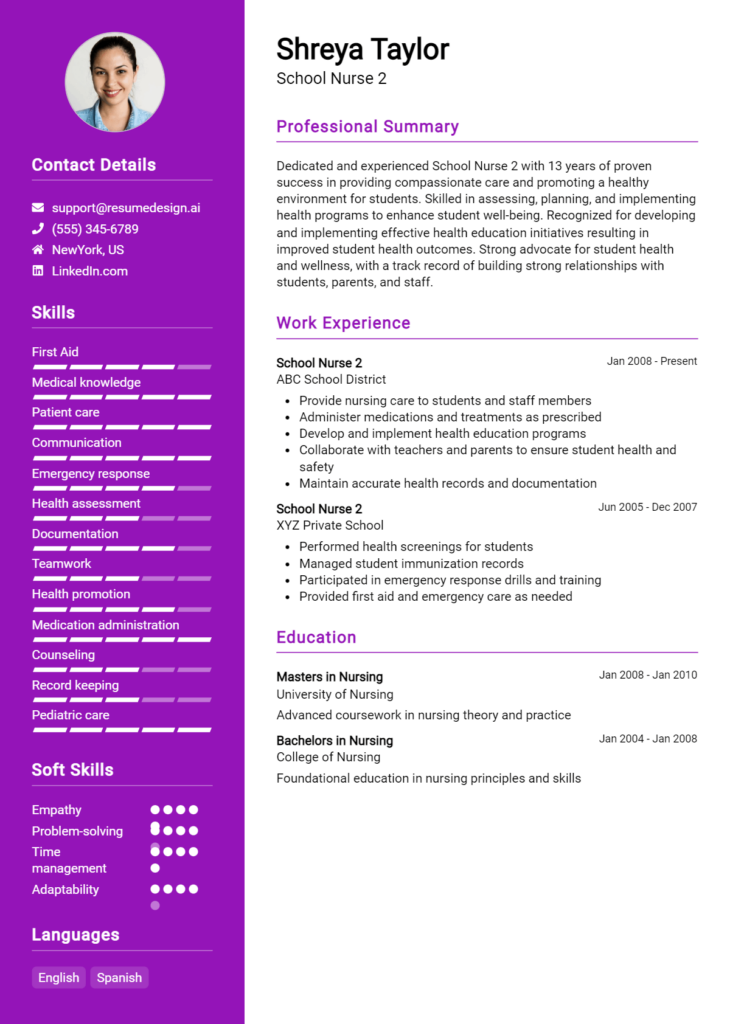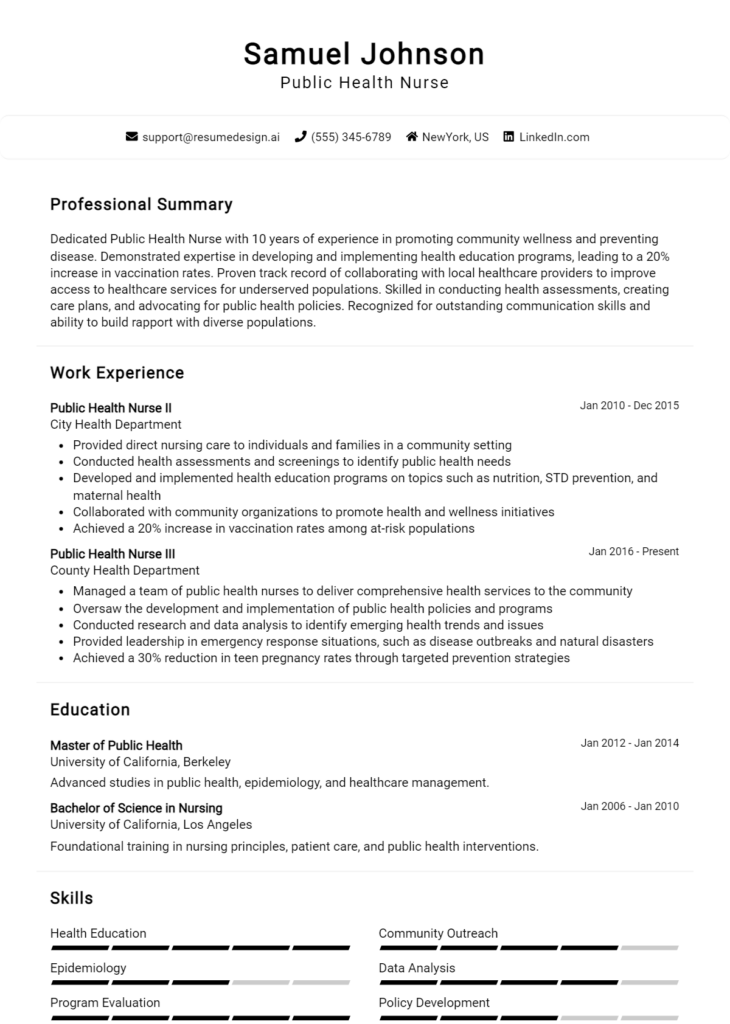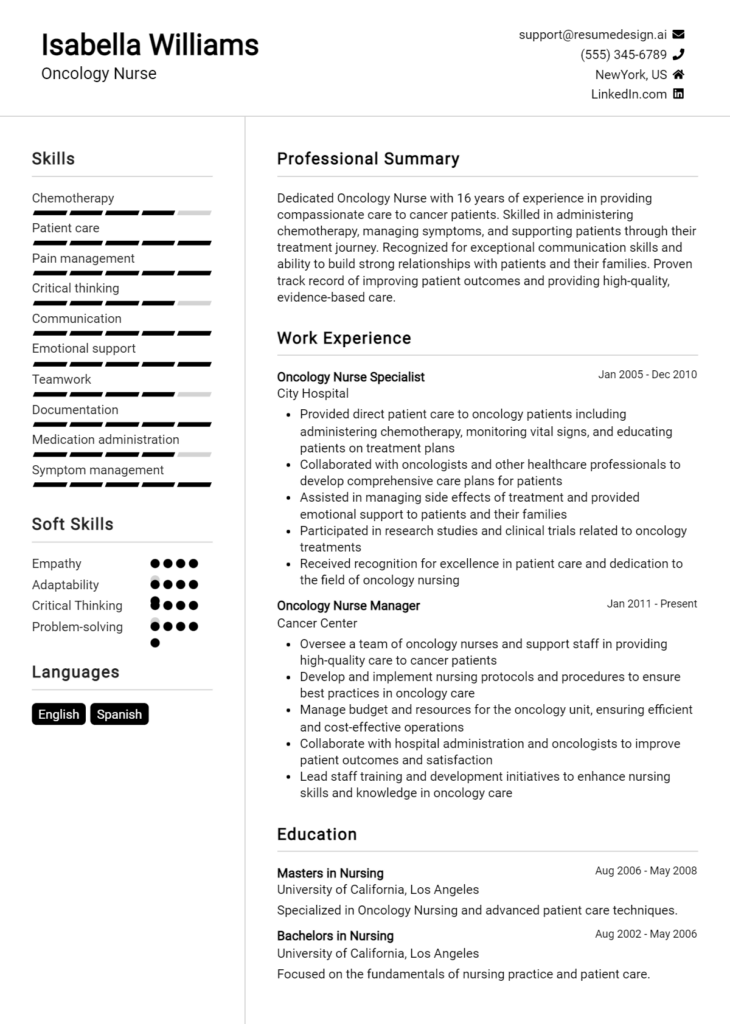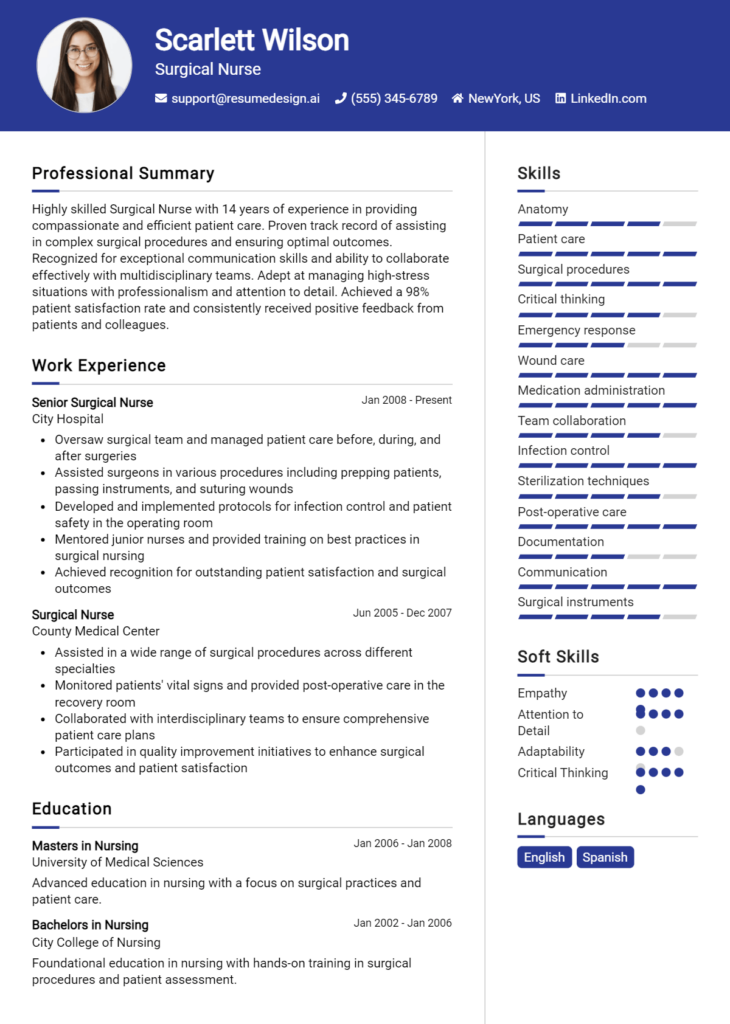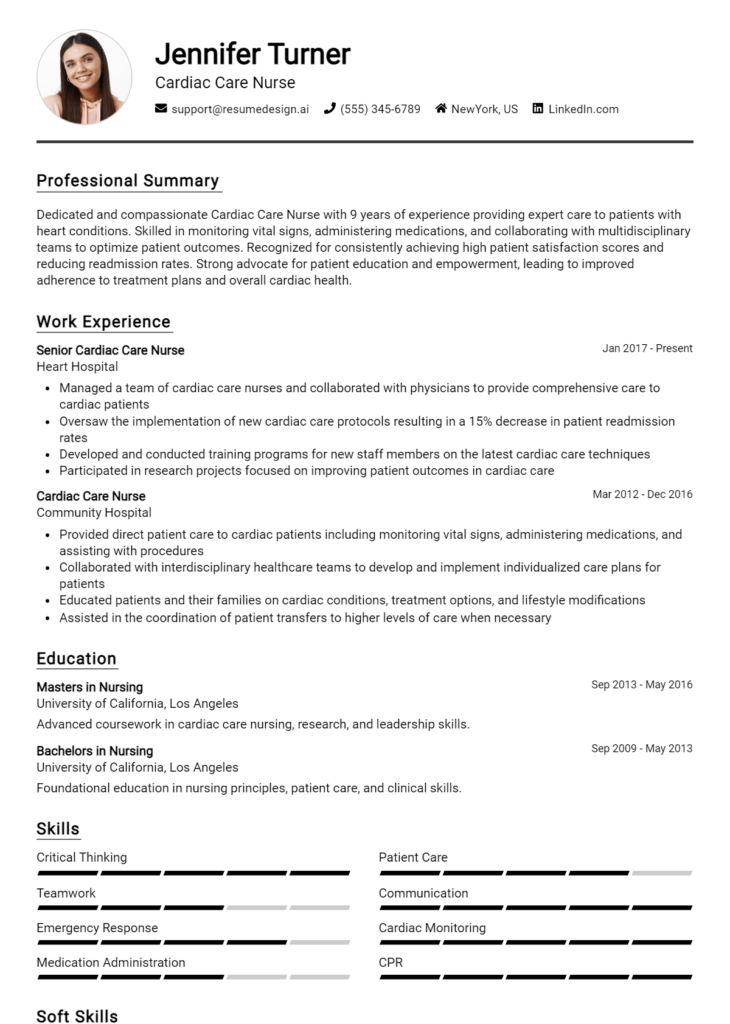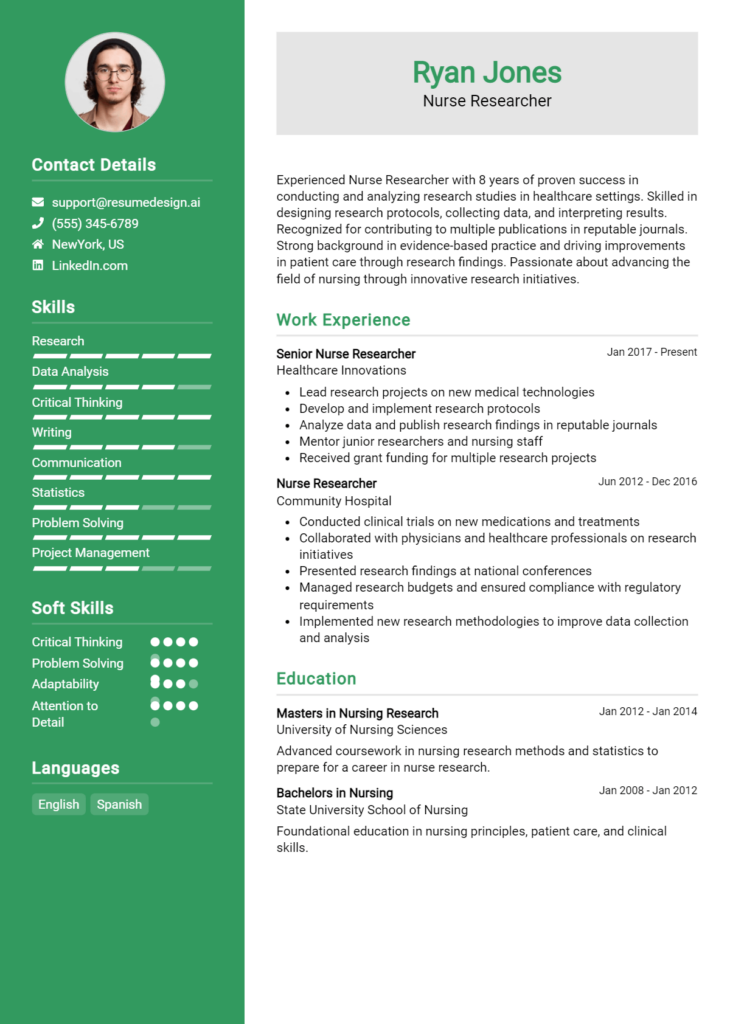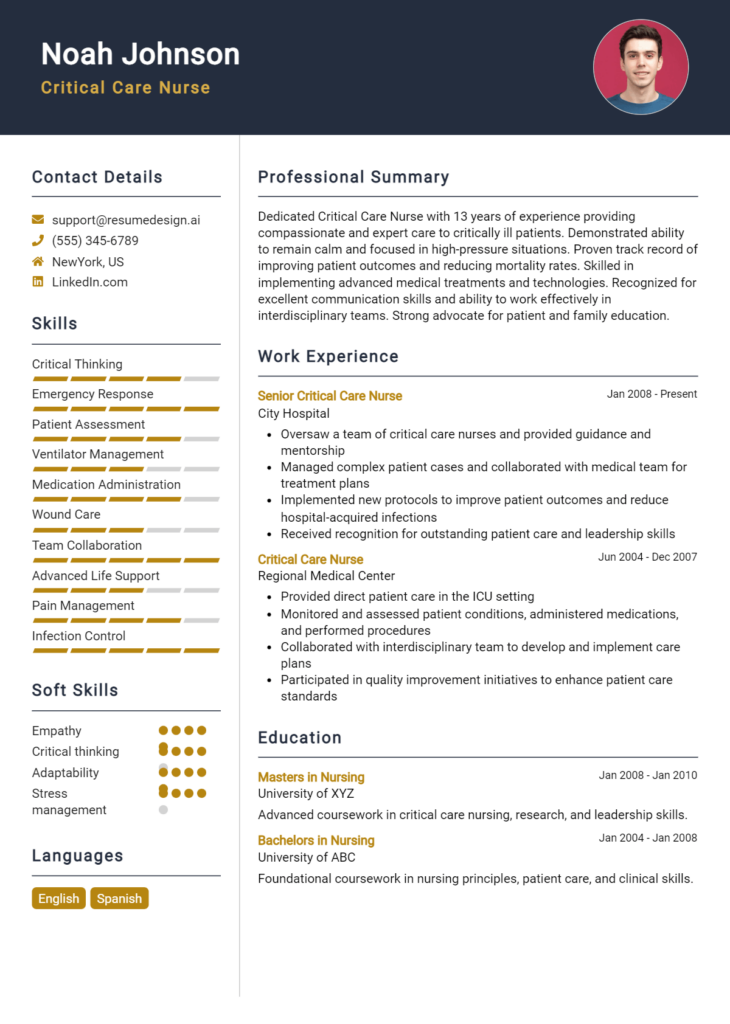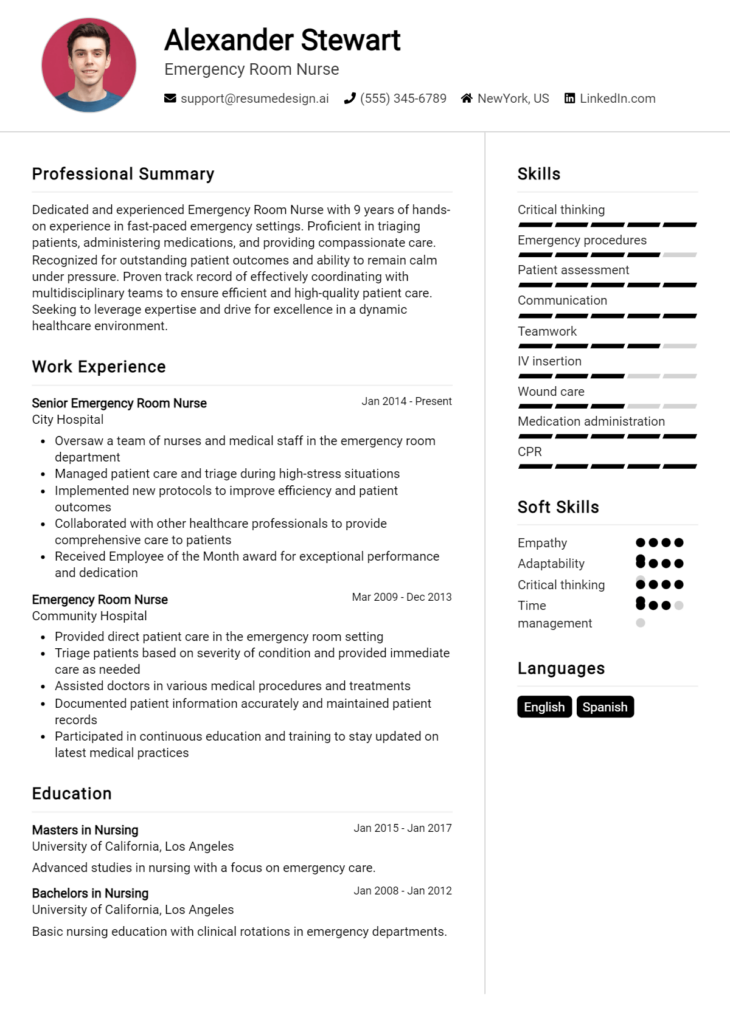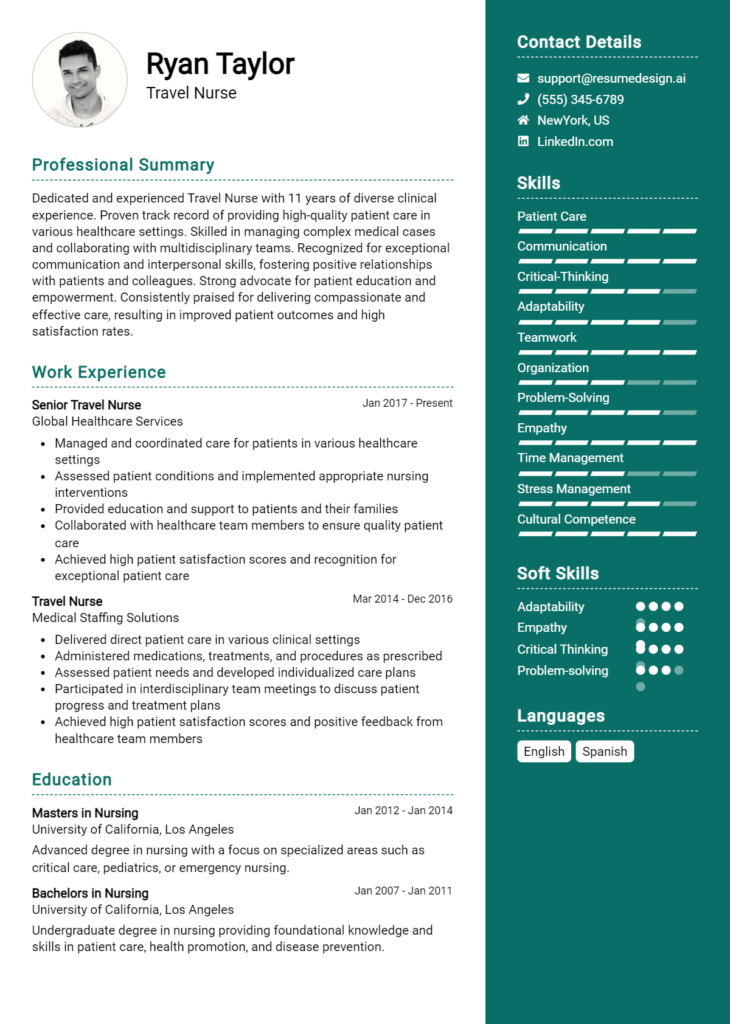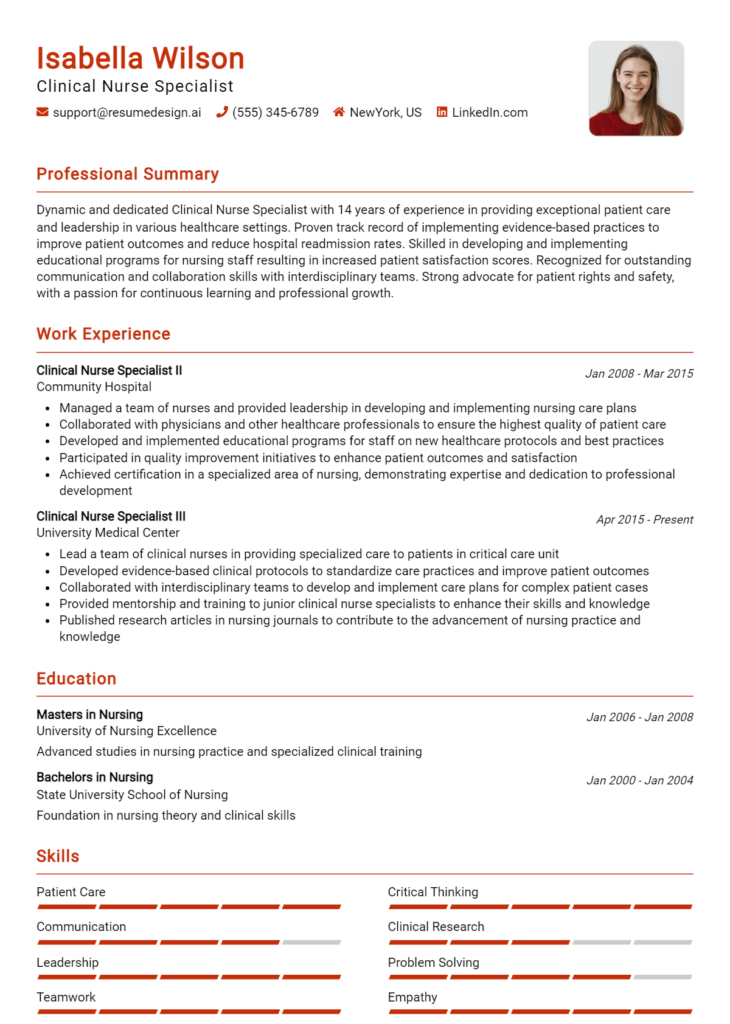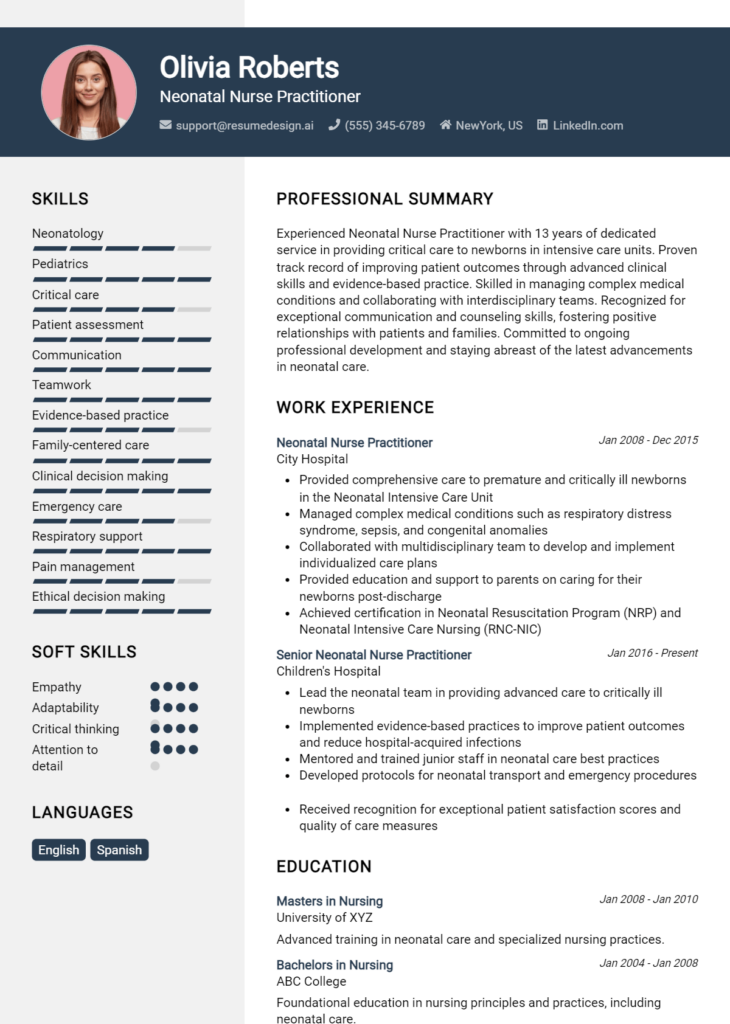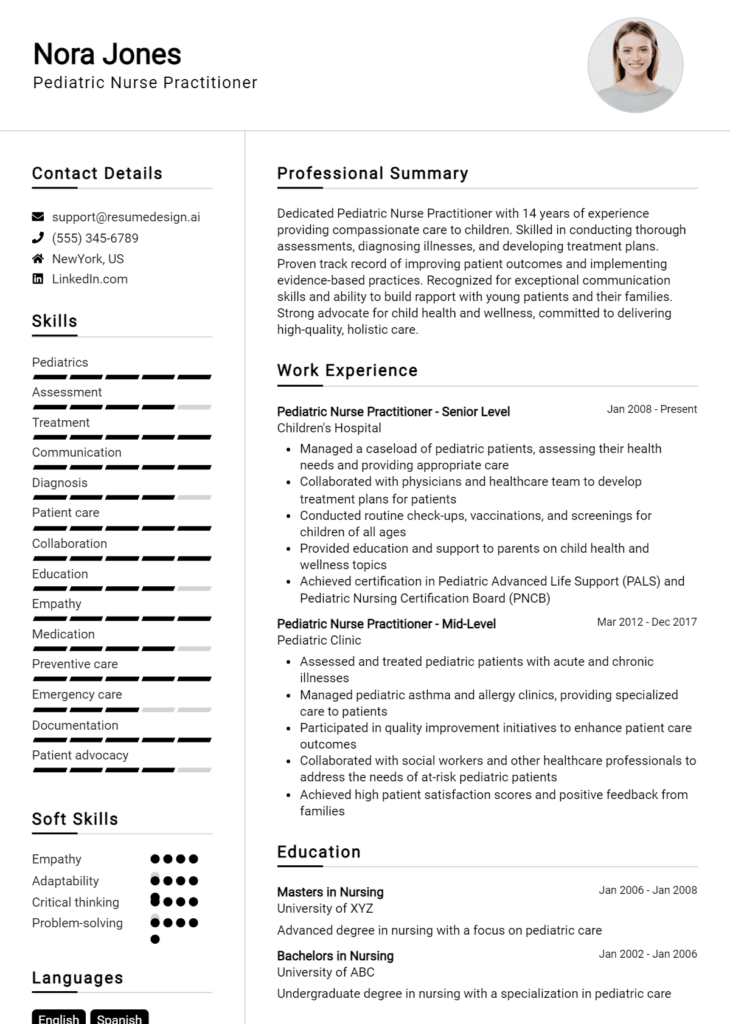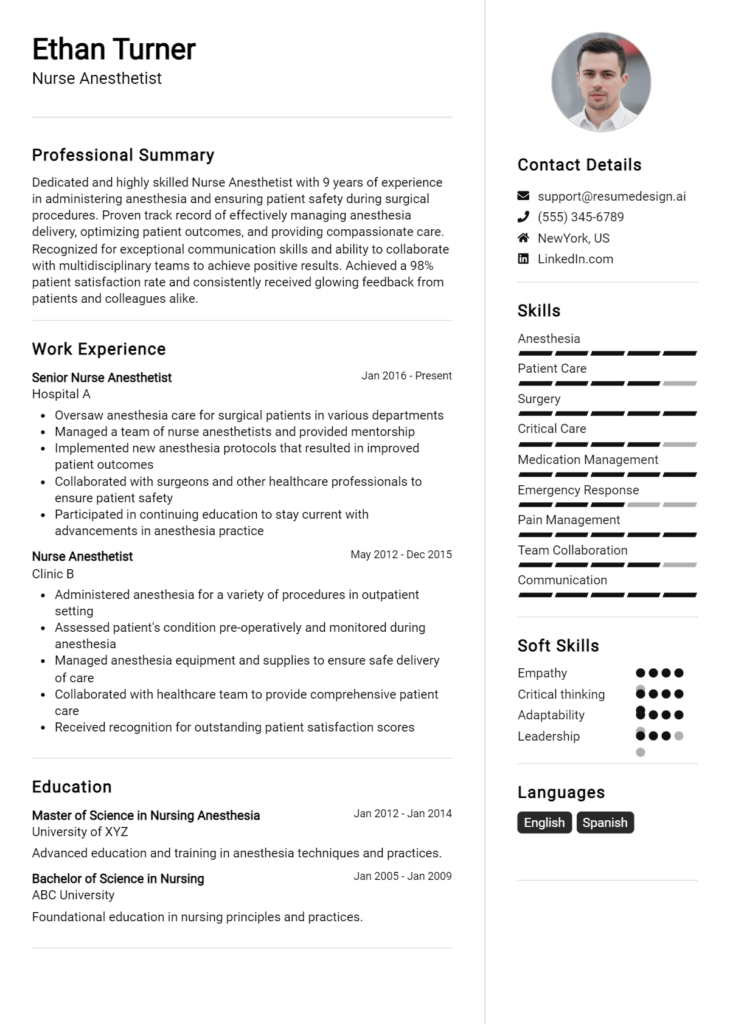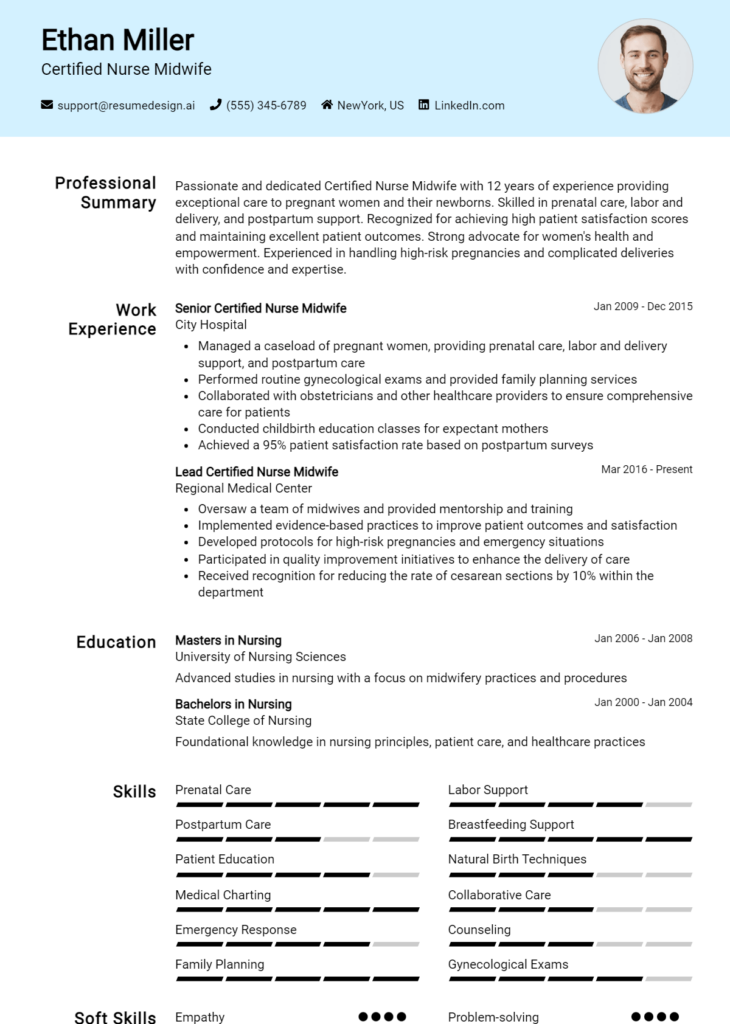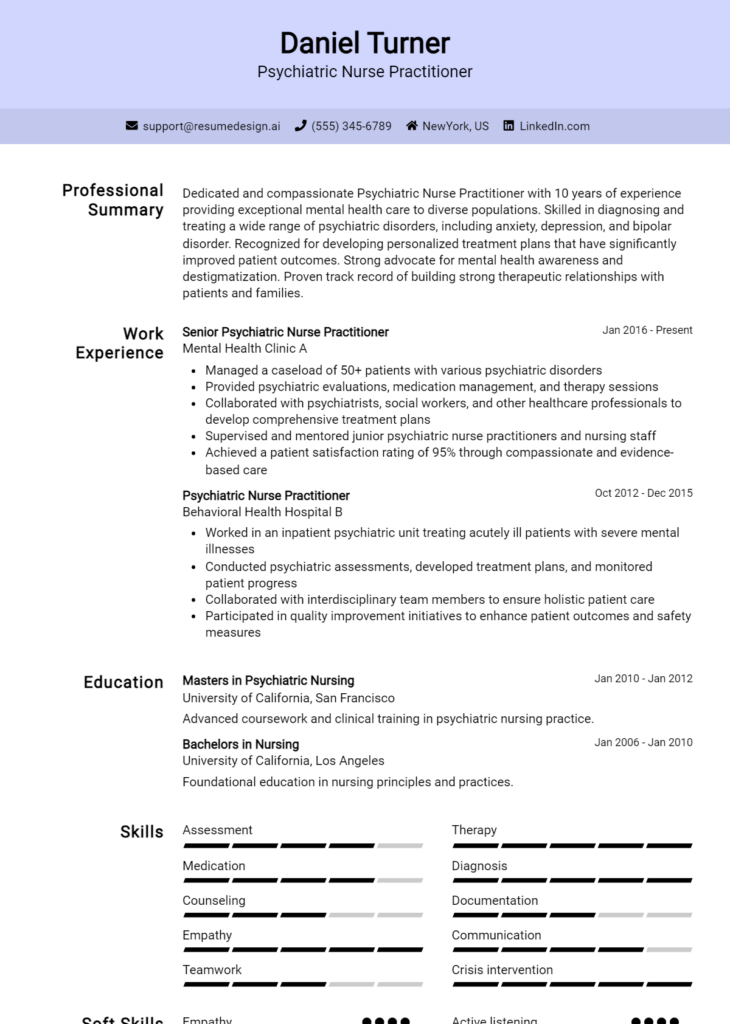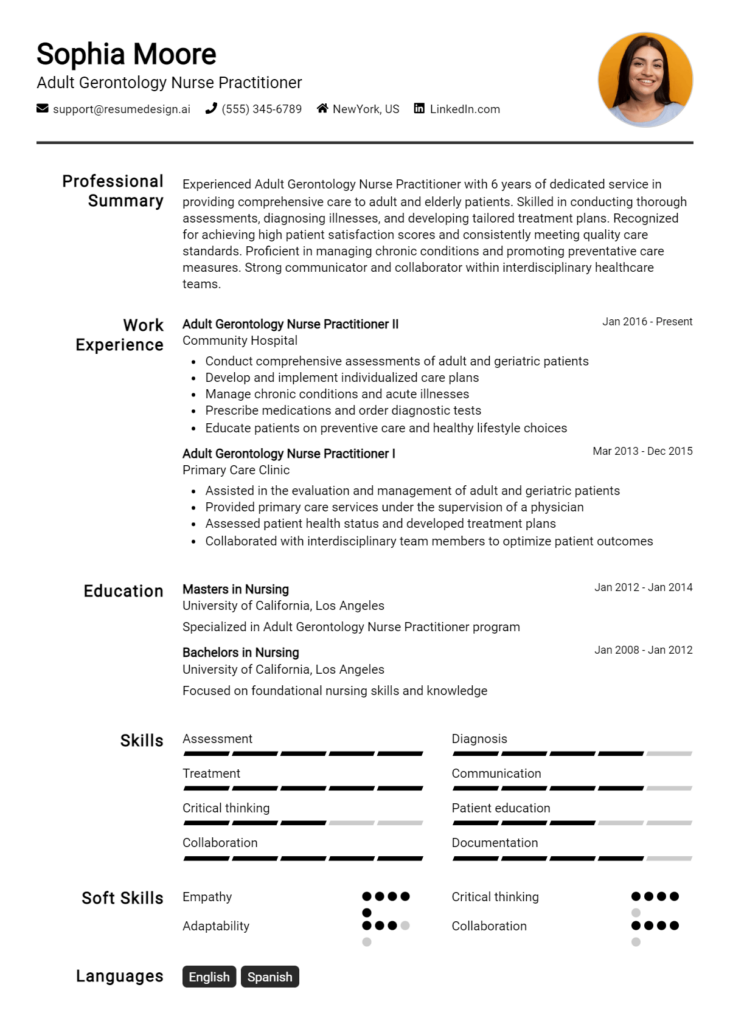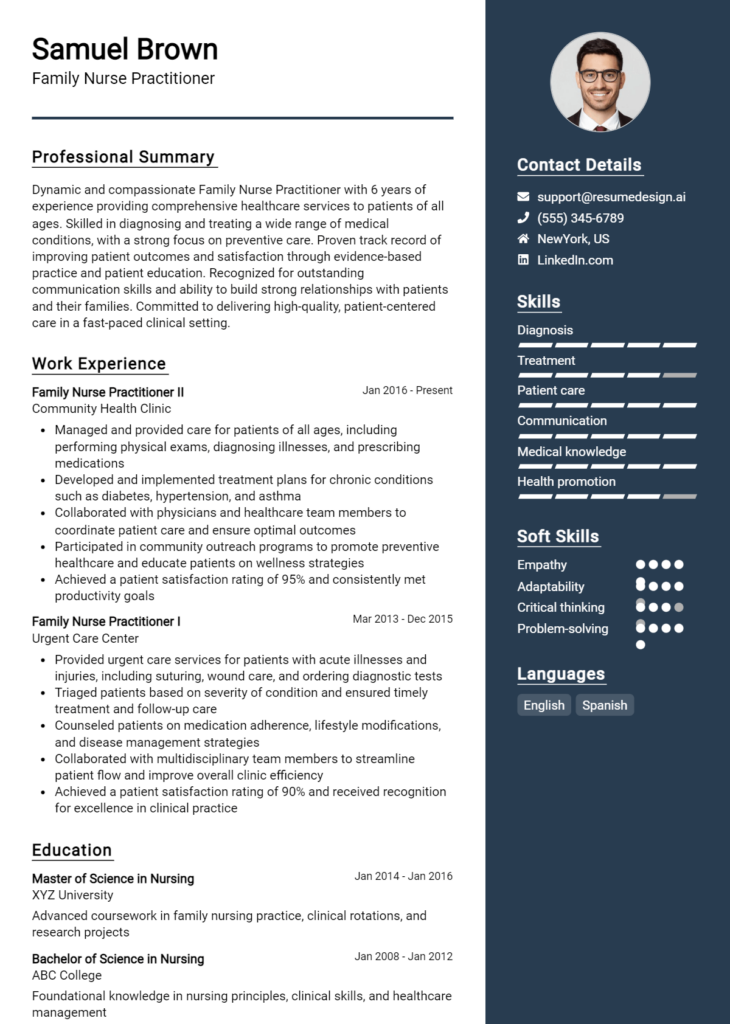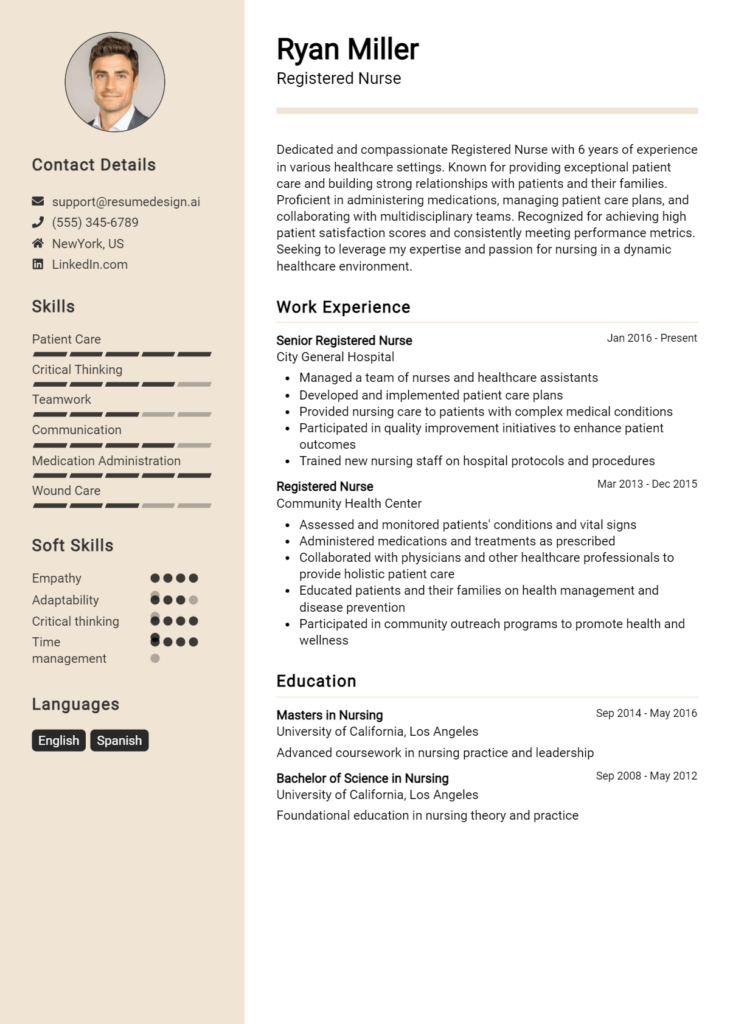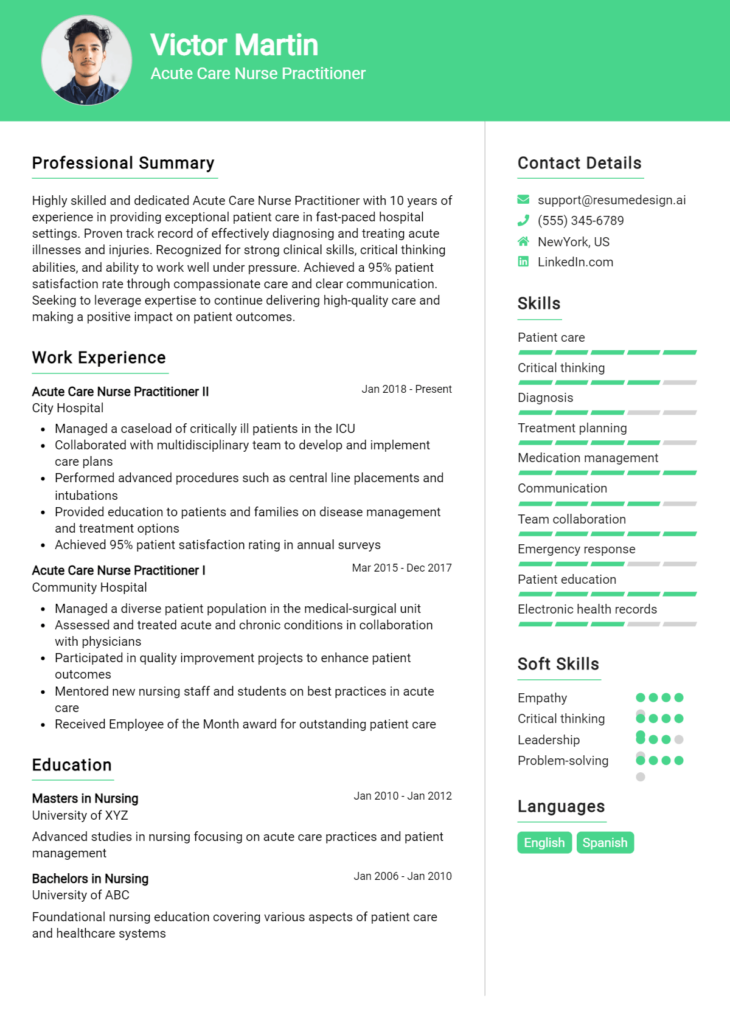Nurse Educator Core Responsibilities
Nurse Educators play a crucial role in bridging clinical practice and academic instruction, ensuring that nursing staff are well-prepared to meet patient care challenges. Key responsibilities include developing curricula, conducting training sessions, and evaluating student progress. Essential skills encompass technical expertise, operational efficiency, and advanced problem-solving abilities, all vital for fostering a competent nursing workforce. By effectively showcasing these qualifications on a well-structured resume, Nurse Educators can significantly contribute to achieving the organization’s overall goals.
Common Responsibilities Listed on Nurse Educator Resume
- Designing and implementing nursing education programs
- Conducting workshops and seminars for nursing staff
- Assessing and evaluating student learning outcomes
- Collaborating with healthcare professionals and departments
- Staying updated with nursing trends and best practices
- Providing mentorship and guidance to nursing students
- Administering assessments and maintaining records
- Utilizing technology to enhance learning experiences
- Participating in quality improvement initiatives
- Facilitating interprofessional education opportunities
- Developing instructional materials and resources
- Promoting a culture of lifelong learning among nursing staff
High-Level Resume Tips for Nurse Educator Professionals
In the competitive field of nursing education, a well-crafted resume is essential for Nurse Educator professionals seeking to make a lasting first impression on potential employers. Your resume serves as a critical marketing tool that not only showcases your clinical expertise but also highlights your teaching abilities, leadership roles, and contributions to nursing education. A strong resume reflects not only your skills and achievements but also your passion for educating future nurses. In this guide, we will provide practical and actionable resume tips specifically tailored for Nurse Educator professionals to help you stand out in a crowded job market.
Top Resume Tips for Nurse Educator Professionals
- Tailor your resume to the specific job description, using keywords and phrases that match the requirements and responsibilities outlined in the posting.
- Highlight your relevant teaching experience, including any courses taught, curriculum developed, or programs initiated.
- Quantify your achievements by including metrics such as student pass rates, retention rates, or any awards received for excellence in education.
- Emphasize your clinical expertise, showcasing any specialized areas of nursing practice that enhance your teaching credentials.
- Include certifications and licenses relevant to nursing education, such as Certified Nurse Educator (CNE) or advanced practice nursing credentials.
- Demonstrate your commitment to professional development by listing workshops, seminars, or conferences you have attended, particularly those related to nursing education.
- Showcase your ability to integrate technology into your teaching methods, mentioning any e-learning platforms or innovative teaching strategies you've employed.
- Utilize a clean, professional format that enhances readability, ensuring that your resume is visually appealing and easy to navigate.
- Incorporate a summary statement at the beginning of your resume that encapsulates your qualifications and career goals as a Nurse Educator.
By implementing these tips, you can significantly increase your chances of landing a job in the Nurse Educator field. A tailored resume that effectively showcases your skills, achievements, and passion for nursing education will not only capture the attention of hiring managers but also position you as a strong candidate in this vital profession.
Why Resume Headlines & Titles are Important for Nurse Educator
In the competitive field of nursing education, a well-crafted resume headline or title can serve as a powerful tool to capture the attention of hiring managers. For a Nurse Educator, this concise phrase acts as a succinct summary of the candidate’s qualifications and expertise, effectively highlighting their suitability for the role. A strong headline can immediately convey critical information such as years of experience, specialized skills, or notable achievements, making it easier for employers to recognize the candidate's potential at a glance. Therefore, it is essential that the headline be relevant, impactful, and directly aligned with the job being applied for, ensuring it resonates with the specific needs of the hiring institution.
Best Practices for Crafting Resume Headlines for Nurse Educator
- Keep it concise: Aim for a headline that is no longer than one or two sentences.
- Be role-specific: Tailor the headline to reflect the Nurse Educator position and its requirements.
- Highlight key strengths: Focus on skills, experiences, or accomplishments that set you apart.
- Use action verbs: Begin with strong action words to convey confidence and expertise.
- Incorporate relevant keywords: Use industry-specific terms that align with the job description.
- Showcase certifications or credentials: If applicable, mention any relevant qualifications or certifications.
- Avoid jargon: Keep the language clear and straightforward to ensure it’s easily understood.
- Make it unique: Strive for originality to stand out among other candidates.
Example Resume Headlines for Nurse Educator
Strong Resume Headlines
Dedicated Nurse Educator with 10+ Years of Experience in Clinical Teaching and Curriculum Development
Compassionate Nurse Educator Specializing in Simulation-Based Learning and Patient Care Techniques
Innovative Nurse Educator with Proven Track Record in Enhancing Student Engagement and Learning Outcomes
Certified Nurse Educator Committed to Fostering Clinical Excellence and Lifelong Learning in Nursing Students
Weak Resume Headlines
Nurse with Experience
Education Professional
Nurse Educator Seeking Opportunities
Strong headlines are effective because they are specific, showcasing the candidate's unique qualifications and aligning closely with the desired role. They illustrate both experience and expertise in a manner that immediately appeals to hiring managers. In contrast, weak headlines tend to be vague and generic, failing to provide any substantive information about the candidate's qualifications. This lack of specificity diminishes the impact of the resume, making it less likely to stand out in a competitive job market.
Writing an Exceptional Nurse Educator Resume Summary
A well-crafted resume summary is crucial for Nurse Educators as it serves as the first impression for hiring managers. In a competitive job market, a strong summary quickly captures their attention by effectively showcasing the candidate's key skills, relevant experience, and significant accomplishments tailored to the specific job role. This concise and impactful summary not only highlights the candidate's qualifications but also sets the tone for the rest of the resume, making it imperative to tailor it for each application.
Best Practices for Writing a Nurse Educator Resume Summary
- Quantify Achievements: Use numbers to demonstrate your impact, such as the number of students taught or improvement in exam results.
- Focus on Relevant Skills: Highlight key competencies that match the job description, such as curriculum development, mentorship, or clinical expertise.
- Tailor for the Job Description: Customize your summary for each application to align with the specific requirements and values of the employer.
- Keep it Concise: Aim for 2-4 sentences that deliver a powerful message without overwhelming the reader.
- Use Action Verbs: Start with strong action verbs to convey your accomplishments assertively.
- Highlight Certifications and Education: Mention relevant certifications or degrees that enhance your qualifications as an educator.
- Showcase Passion for Teaching: Include a statement that reflects your commitment to nursing education and student success.
- Maintain Professional Tone: Ensure that the summary is professional and reflects your personality as an educator.
Example Nurse Educator Resume Summaries
Strong Resume Summaries
Dedicated Nurse Educator with over 10 years of experience in clinical instruction and curriculum development, successfully improving student pass rates by 30% through innovative teaching methods and personalized mentoring.
Compassionate Nursing Professional with a Master's degree in Nursing Education, recognized for developing an award-winning clinical training program that increased student competency scores by 25% in one year.
Dynamic Nurse Educator with expertise in simulation-based learning and a track record of training over 300 nursing students annually, leading to a 95% first-attempt NCLEX pass rate.
Weak Resume Summaries
Experienced nurse looking for a teaching position in nursing education.
Nurse Educator with some teaching experience and a background in nursing.
The strong resume summaries are considered effective because they provide specific achievements and quantify the impact the candidate has had in their roles, demonstrating clear relevance to the Nurse Educator position. They convey a sense of purpose and expertise, making them stand out to hiring managers. In contrast, the weak summaries are vague and lack detail, failing to showcase any measurable outcomes or relevant skills that would attract the attention of potential employers.
Work Experience Section for Nurse Educator Resume
The work experience section of a Nurse Educator resume is crucial as it highlights a candidate's technical skills, leadership capabilities, and commitment to delivering high-quality educational products. This section not only demonstrates the applicant's ability to manage and train nursing staff but also emphasizes their accomplishments in improving nursing practices and patient care outcomes. By quantifying achievements and aligning experiences with industry standards, candidates can effectively showcase their value to potential employers, making it a key component of their resume.
Best Practices for Nurse Educator Work Experience
- Use specific metrics to quantify achievements (e.g., improved student pass rates by 20%).
- Highlight technical skills relevant to nursing education, such as curriculum development or simulation training.
- Emphasize leadership roles in team settings, showcasing mentorship and collaboration.
- Align experiences with nursing education standards and competencies.
- Focus on outcomes that benefit both students and the healthcare institution.
- Incorporate keywords from job descriptions to enhance relevance.
- Include professional development activities that demonstrate ongoing learning.
- Tailor each entry to reflect the specific requirements of the position applied for.
Example Work Experiences for Nurse Educator
Strong Experiences
- Developed and implemented a new nursing curriculum that increased student retention rates by 15% over two academic years.
- Facilitated a series of workshops that improved clinical simulation skills among 50 nursing students, resulting in a 25% increase in competency assessments.
- Led a team of educators to redesign the assessment process, which enhanced feedback mechanisms and reduced grading turnaround time by 30%.
- Collaborated with healthcare partners to create a comprehensive clinical placement program, achieving a 90% placement success rate for graduating students.
Weak Experiences
- Taught nursing courses and helped students learn.
- Participated in meetings about curriculum changes.
- Was involved in student assessments and evaluations.
- Assisted with various administrative duties in the nursing department.
The examples listed as strong experiences are considered effective because they provide specific, quantifiable outcomes that demonstrate the candidate's impact on nursing education. They highlight leadership, collaboration, and technical skills in a measurable way. In contrast, the weak experiences fail to convey any significant achievements or responsibilities, often lacking detail and specificity, which diminishes their overall impact on the resume.
Education and Certifications Section for Nurse Educator Resume
The education and certifications section of a Nurse Educator resume plays a crucial role in demonstrating the candidate's academic qualifications and ongoing commitment to professional development. This section not only showcases the foundational knowledge acquired through formal education but also highlights industry-relevant certifications and specialized training that are essential for effective teaching in nursing. By providing details about relevant coursework and certifications, candidates can enhance their credibility and better align themselves with the requirements of the Nurse Educator role, thereby increasing their chances of being selected for interviews.
Best Practices for Nurse Educator Education and Certifications
- Prioritize listing advanced degrees, such as a Master’s or Doctorate in Nursing Education or related fields.
- Include industry-recognized certifications, like Certified Nurse Educator (CNE), to demonstrate specialized expertise.
- Detail relevant coursework that aligns with the job description to showcase applicable knowledge and skills.
- Highlight any continuing education courses or workshops that reflect ongoing professional development.
- Be specific about the institutions attended and the dates of completion to lend credibility to your qualifications.
- Avoid listing outdated certifications or degrees that do not pertain to nursing education.
- Consider including honors or recognitions received during your educational journey to stand out.
- Keep the format clean and organized, making it easy for hiring managers to quickly assess your qualifications.
Example Education and Certifications for Nurse Educator
Strong Examples
- Master of Science in Nursing Education, University of Health Sciences, 2020
- Certified Nurse Educator (CNE), National League for Nursing, 2021
- Advanced Teaching Strategies in Nursing Course, Online Educational Institute, 2022
- Bachelor of Science in Nursing, State University, 2015
Weak Examples
- Associate Degree in Nursing, Community College, 2010
- Basic Life Support (BLS) Certification, Expired 2020
- Certificate in Medical Assisting, Technical Institute, 2015
- High School Diploma, 2005
The strong examples listed above are considered effective because they directly align with the qualifications necessary for a Nurse Educator, showcasing advanced degrees and relevant certifications that highlight the candidate's expertise in nursing education. In contrast, the weak examples reflect outdated or irrelevant qualifications that do not support the candidate's suitability for the role, such as an expired certification or a degree that lacks relevance to nursing education. This disparity emphasizes the importance of curating educational credentials that reinforce a candidate's qualifications for the Nurse Educator position.
Top Skills & Keywords for Nurse Educator Resume
As a Nurse Educator, the significance of possessing a well-rounded set of skills cannot be overstated. A strong resume is essential for showcasing these skills, as they reflect the ability to effectively teach, mentor, and guide nursing students and new nurses. A blend of both hard and soft skills is crucial for success in this role, as it not only encompasses clinical knowledge and technical expertise but also interpersonal abilities that enhance the learning environment. Highlighting these skills on a resume can greatly improve a candidate's chances of standing out in a competitive field. For further insights, explore more about skills and work experience.
Top Hard & Soft Skills for Nurse Educator
Soft Skills
- Communication
- Empathy
- Leadership
- Adaptability
- Conflict Resolution
- Teamwork
- Mentoring
- Time Management
- Problem-Solving
- Critical Thinking
- Active Listening
- Patience
- Organization
- Cultural Competence
- Interpersonal Skills
- Creativity
- Motivational Skills
Hard Skills
- Curriculum Development
- Clinical Assessment
- Patient Education
- Simulation-Based Learning
- Research Methodology
- Knowledge of Nursing Theories
- Evaluation and Assessment Techniques
- Instructional Design
- Healthcare Technology Proficiency
- Evidence-Based Practice
- Regulatory Compliance
- Data Analysis
- Nursing Informatics
- Quality Improvement Initiatives
- Professional Development
- Teaching Methodologies
- Clinical Guidelines and Protocols
Stand Out with a Winning Nurse Educator Cover Letter
As a dedicated and experienced nursing professional, I am excited to apply for the Nurse Educator position at [Healthcare Institution Name]. With a strong background in clinical nursing and a passion for teaching, I am committed to nurturing the next generation of nurses through effective educational strategies and hands-on training. My experience in both direct patient care and nursing education has equipped me with the skills necessary to provide comprehensive learning experiences that enhance clinical competencies and foster critical thinking.
In my previous role as a Clinical Nurse Educator at [Previous Institution Name], I developed and facilitated innovative training programs that addressed the evolving needs of nursing practice. By implementing evidence-based teaching methodologies, I successfully improved knowledge retention and application among nursing students and staff. I believe that creating an engaging learning environment is crucial for student success, and I strive to incorporate interactive elements and real-world scenarios into my teaching. My commitment to mentorship has also allowed me to build strong relationships with my students, guiding them through their educational journeys and supporting their professional growth.
Moreover, I am adept at collaborating with interdisciplinary teams to design curriculum that aligns with current healthcare standards and best practices. I have a proven track record of assessing the effectiveness of educational programs and making data-driven adjustments to improve outcomes. My strong communication skills enable me to convey complex concepts in an accessible manner, ensuring that all learners grasp the material and can apply it confidently in clinical settings.
I am excited about the opportunity to contribute to the educational mission of [Healthcare Institution Name] and to support the development of future nursing leaders. I am confident that my expertise, combined with my enthusiasm for teaching, will make a positive impact on your nursing program. Thank you for considering my application; I look forward to the possibility of discussing how I can contribute to your team.
Common Mistakes to Avoid in a Nurse Educator Resume
When crafting a resume for a Nurse Educator position, it’s essential to present a polished and professional document that accurately reflects your qualifications and experience. However, many candidates make common mistakes that can undermine their application. Avoiding these pitfalls can significantly enhance your chances of landing an interview and showcasing your expertise in nursing education.
Neglecting to Tailor the Resume: Failing to customize your resume for the specific Nurse Educator position can make it seem generic and irrelevant. Highlight experiences and skills that align with the job description.
Using Jargon or Complex Language: While it’s important to demonstrate your expertise, using overly technical language or jargon can confuse hiring managers. Strive for clarity and simplicity in your wording.
Ignoring Formatting and Design: A cluttered or unprofessional-looking resume can detract from your qualifications. Use clear headings, bullet points, and consistent formatting to enhance readability.
Listing Responsibilities Instead of Achievements: Simply stating your job duties fails to convey the impact you’ve had in your roles. Focus on quantifiable achievements and contributions that highlight your effectiveness as an educator.
Omitting Relevant Certifications and Licenses: As a Nurse Educator, specific certifications and licenses are crucial. Ensure that you prominently feature your nursing license, educational credentials, and any relevant certifications.
Including Irrelevant Work Experience: Including unrelated job experiences can dilute your resume. Focus on highlighting roles and experiences that are directly applicable to nurse education.
Failing to Highlight Teaching Experience: If you have previous teaching or mentoring experience, it’s vital to showcase it. Highlight specific courses taught, curricula developed, or innovative teaching methods implemented.
Neglecting to Proofread: Spelling and grammatical errors can create a negative impression of your attention to detail and professionalism. Always proofread your resume and consider asking a peer for feedback before submission.
Conclusion
As we have explored in this article, the role of a Nurse Educator is pivotal in shaping the next generation of healthcare professionals. We discussed the key responsibilities, which include developing educational programs, mentoring nursing students, and staying updated with the latest medical practices. Furthermore, we highlighted the importance of effective communication skills, a deep understanding of nursing practices, and a passion for teaching as essential attributes for success in this position.
In addition, we examined the educational qualifications and certifications necessary to excel as a Nurse Educator. The ability to engage students and foster a conducive learning environment is crucial, as is the commitment to ongoing professional development.
As you reflect on your career as a Nurse Educator, it's vital to ensure that your resume effectively showcases your skills, experience, and passion for education. Now is the perfect time to review and enhance your Nurse Educator Resume to stand out in the competitive job market.
Utilize the available resources to help you craft a compelling resume. Check out resume templates, use the intuitive resume builder, look at resume examples, and create a professional cover letter with our cover letter templates. Take action today and ensure your resume reflects your qualifications and dedication to nursing education!

